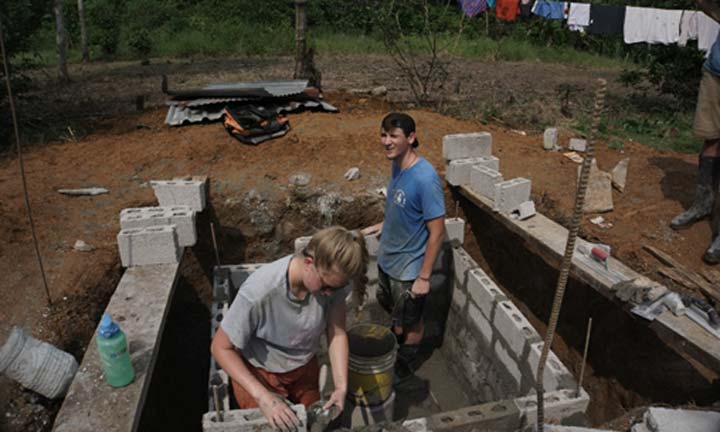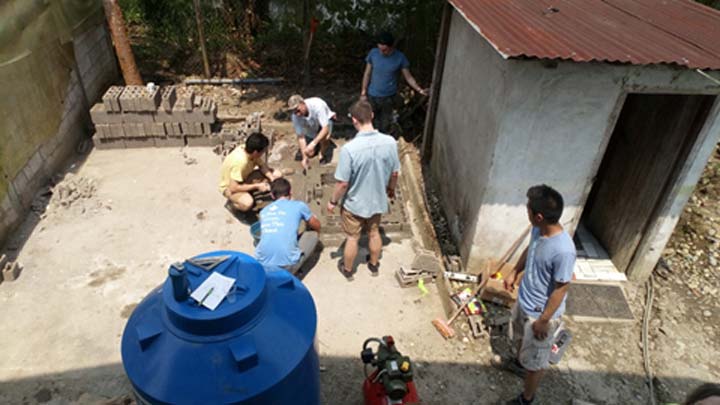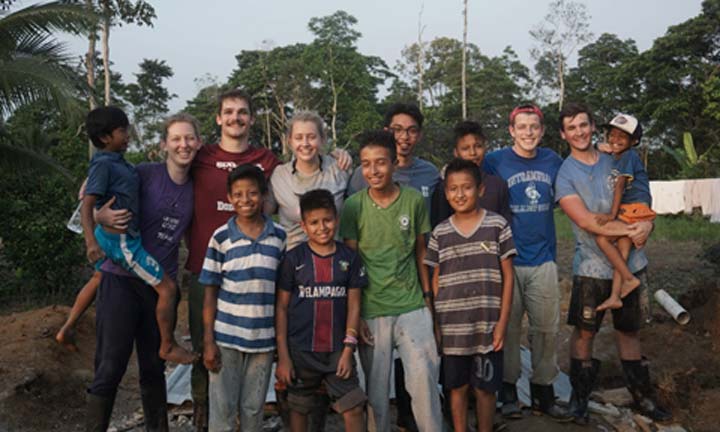Benedictine College Engineering Missionaries
The Benedictine College Engineering Mission Team strives to improve living conditions in developing countries by using engineering skills taught in the classroom. This opportunity allows students to use their time and talent to produce a change in struggling communities while solidifying knowledge acquired from their engineering education. The mission trip is led by students with the engineering guidance of Benedictine College professors. Mission projects and locations are often determined following much research completed by the team of engineering students. The School of Engineering has coordinated six extremely successful and unique projects over the past six years.
- Guatemala (2015): Roof and Truss System for Community Center
- Ghana (2016): Water Storage and Pumping System for Local Village
- Peru (2017): Greenhouse to Supplement Parish School Lunch Program
- Nicaragua (2018): Site Development for A Simple House Mission Land and Local Community
- Ecuador (2019): Renovated Bathrooms, updating a Family Missions’ house, and installed a water pump and tank
- West Virginia (2020): The 2020 mission trip was planned for Ecuador, but due to COVID-19 the mission trip was moved to West Virginia, where they helped at Nazareth Farm
- Louisiana (2021): The 2021 mission trip was planned for Louisiana, but due to COVID-19 the trip was postponed. Students were going to help Family Missions update homes and build a Church.
Throughout the academic school year of 2017 and 2018, the Engineering Mission Team collaborated with A Simple House – Nicaragua, a recent branch originating from the Kansas City non-profit. Working with the organization, the students assisted in design and calculations for various projects such as a new workshop, a retaining wall, and a shipping container hoist. While in Nicaragua, the team surveyed the land recently acquired by A Simple House. Upon return to Benedictine College, the survey data was used to create a topographic map of the area. Other projects completed on the trip included fixing water supply lines and installing a water storage tank at a nearby school as well as building a road and retaining wall on the mission land.

Prior to the actual travel dates and throughout the spring break trip, the team incorporated the Catholic faith into the mission. Fundraising, planning, and other meetings started with a prayer. While in Nicaragua, the team began each morning with a Rosary or morning prayer. Adoration and Mass were frequently scheduled for the group along with time for reflection and solitude.

Although the primary focus of the annual trips is an engineering project, each mission trip allows for many diverse opportunities for the team to serve the community. Activities such as cooking meals for those without food, painting walls at nearby schools, participating in community events, playing with local children, and many other service activities are incorporated into the trips. According to the feedback from the trip participants, this genuine immersion into the community’s struggles, celebrations, and daily experiences allows the team members to begin to understand the culture and empathize with the people in need. This building of relationship between the missionaries and the communities they touch is what will have a truly lasting impact on both parties.
Many people question the worth of short-term mission trips, but as Benedictine College professor Dr. Newbolds explained during the most recent trip, “Some people say it is better to just send the money to help the poor. However, this assumes that the only thing the people need is money. While they are lacking in material goods, there is often another essential life component they are missing: love.” As aspiring engineers, the mission team will certainly put forth immense effort each year to create a project that will impact the community in the most powerful way. However, without a doubt, each team member will walk away with a greater understanding of the more important component of mission work: loving the person you serve.

Having seen firsthand the benefits of the engineering mission trip, I would like to thank each supporter for their prayers and donations. Not only does the mission trip continue to improve the quality of life for a developing community, it also brings to surface the true message of mission for those students and faculty learning to serve. Please pray for us and our future mission work with Benedictine College Engineering.
God Bless,
Kienan McIntee
Engineering Mission Trip Leader
Mechanical Engineering 2019
